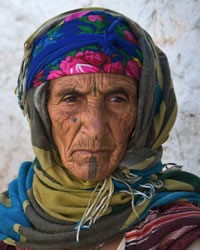Berber, Taznatit in Morocco

Photo Source:
Alain Bachellier - Flickr
Creative Commons
|
Send Joshua Project a map of this people group.
|
| People Name: | Berber, Taznatit |
| Country: | Morocco |
| 10/40 Window: | Yes |
| Population: | 15,000 |
| World Population: | 20,900 |
| Primary Language: | Taznatit |
| Primary Religion: | Islam |
| Christian Adherents: | 0.00 % |
| Evangelicals: | 0.00 % |
| Scripture: | Portions |
| Ministry Resources: | Yes |
| Jesus Film: | No |
| Audio Recordings: | No |
| People Cluster: | Berber-Saharan |
| Affinity Bloc: | Arab World |
| Progress Level: |
|
Introduction / History
The Amazigh, also known as Berbers, are the indigenous people of North Africa. They are a strong and proud people. The very name Amazigh is often translated to mean "free or noble men". There were people from North Africa present in Jerusalem at the day of Pentecost. The church was established among Berbers in the early centuries of Christianity, and some of the great North African church fathers were of Berber heritage.
When Islam swept through North Africa in the 7th century, many pockets of the Amazigh tried to fight the invasion. They resisted Islam's advance ten different times in history, outwardly saying they would become Muslims, but then returning to their villages and refusing to practice the religion. They intentionally built conspicuous white mosques at the top of the mountains to deceive Muslim invaders. As they passed, seeing the mosque in the distance, they would assume the village had already converted and continue their way.
Early generations kept their Christian heritage in secret and outwardly submitted to Islamic rule. The symbolism of the cross can still be found throughout Amazigh architecture, designs on handmade carpets, and even tattoos on women's faces. Today, however, they have no understanding of their Christian heritage.
Berbers are divided into subgroups, sometimes separated by language, sometimes by geography, and sometimes by national boundaries. One complicated group is the Amazigh of Matmata. In Tunisia, they are known as Matmata Berbers, but in Morocco, they call them Taznatit Berbers.
What Are Their Lives Like?
One thing that makes the Taznatit Berbers different from their Berber counterparts is the degree to which men and women mix socially. The men of the city view women as equal coworkers with men in life, and it is their right to work as men do. The Taznatit Berbers do not have problems with their Arab neighbors. They live close to them, but the Arabs prefer not to work with the Amazigh due to their differing religious perspectives on Islam.
From childhood, they speak Taznatit, an Amazigh language, and also learn to write it. There is an association in their town that exists to encourage people to learn to write the language. In addition, they speak Arabic and French. They use audio-visual media such as radio and TV, and some use the internet.
What Are Their Beliefs?
Taznatit Berbers are Ibadi Muslims, following the Ibadi school of Islam. Their denomination distinguishes them from the majority of Tunisian Muslims who follow the Maliki school. Ibadi Muslims believe that the real Muslim is the one who practices, not just in word, but also in deed. They are considered peaceful people who generally do not look down on other Muslims. Other Muslim denominations, conversely, may look down on and sometimes persecute Ibadi Muslims. The rest of Tunisian Muslims, of the Maliki school, see the Ibadi Amazigh as outsiders.
Muslims follow the teaching of Mohammed, who lived in the 6-7th centuries in Saudi Arabia. They believe in one God, whom they call Allah (Arabic for "the God"). At judgment day, all people will be judged for their deeds and, if their good works outweigh their bad, then Allah will welcome them into paradise. If not, then they will be sentenced to eternal hell. To obtain salvation, they must follow the five pillars of Islam: pray five times a day, fasting from dawn to dusk during the month of Ramadan, giving to the poor, and, if possible, a pilgrimage to Mecca, to be done at least once in their lifetime (Hajj). Regarding Jesus, they believe that he was a prophet, but that his teachings are inferior to those of Mohammad.
What Are Their Needs?
Taznatit Berbers have put their identity in the Islamic religion and their nationality. They need an identity based on the King of kings who gave his life to give them eternal life.
Prayer Points
Pray for bold and loving witnesses of Christ's grace and glory.
Pray for their elders to have dreams and visions of the risen Christ that will open this community to Jesus.
Pray for the Taznatit Berbers to be blessed beyond measure as they learn to follow the Lamb of God who takes away the sins of the world.
Pray for disciples who will make more disciples.